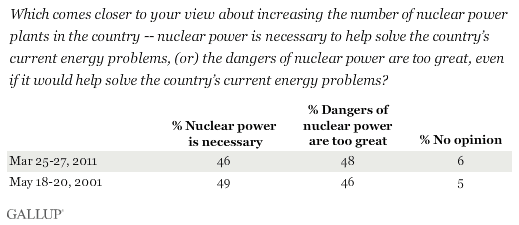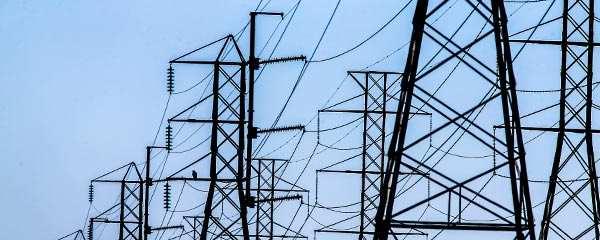PRINCETON, NJ -- Despite concerns about a possible nuclear disaster in the U.S., 58% of Americans think nuclear power plants in the U.S. are safe, while 36% say they are not. Americans are divided on the issue of increasing the number of nuclear power plants in this country, but these attitudes have not changed from 10 years ago.

Nuclear power remains very much in the news as workers in Japan continue efforts to contain the disastrous impact of the March 11 earthquake and tsunami on nuclear power plants along that country's northern coast. In a survey conducted just days later, Gallup found 7 in 10 Americans saying that as a result of the events in Japan, they were more concerned about a nuclear disaster occurring in the U.S. Still, a March 25-27 Gallup survey shows that a clear majority of Americans believe nuclear plants in the U.S. are safe.
There is no exact Gallup trend to which these results can be compared. However, Gallup asked Americans in 2009 about the perceived safety of "nuclear power plants" without specifying their location, finding 56% saying they were safe -- almost identical to results for the current question about nuclear power plants "in the United States."
Results from the survey conducted days after the Japanese disaster show Americans are divided on whether they favor or oppose the construction of nuclear power plants in the U.S. In the late March poll, a separate question reveals that Americans are similarly split when asked to choose between two positions on either side of the issue of increasing the number of nuclear power plants.

Despite all that has changed over the last 10 years, responses to this question did not change materially between its prior asking in May 2001 and the current poll, though it may be possible that attitudes changed between these intervals in unknown ways. Still, this finding suggests there has been no substantial diminution in support for nuclear power plant construction over this past decade -- despite the current, and highly visible, nuclear plant problems in Japan.
Gallup's annual energy update conducted in early March -- just before the Japanese disaster -- found that 57% of Americans favor "the use of nuclear energy as one of the ways to provide electricity for the U.S." This trend question, which does not directly address the issue of an increase in nuclear plants, has been fairly stable in recent years.
Implications
It may be months or years before the final impact of the Japanese disaster on American attitudes toward nuclear power can be assessed. In the short term, Americans are concerned about the dangers of a nuclear crisis in this country. But Gallup's most recent survey suggests that support for nuclear power may be more stable than some might think. A majority of Americans believe nuclear power plants in the U.S. are safe, and attitudes toward increasing their numbers do not appear to have changed in comparison with a previous measure 10 years ago.
Survey Methods
Results for this Gallup poll are based on telephone interviews conducted March 25-27, 2011, with a random sample of 1,027 adults, aged 18 and older, living in the continental U.S., selected using random-digit-dial sampling.
For results based on the total sample of national adults, one can say with 95% confidence that the maximum margin of sampling error is ±4 percentage points.
For the "increasing the number of nuclear power plants in the country" question, based on the sample of 500 national adults in Form A, and for the nuclear power plant safety question, based on 527 national adults in Form B, the maximum margins of sampling error are ±5 percentage points.
Interviews are conducted with respondents on landline telephones (for respondents with a landline telephone) and cellular phones (for respondents who are cell phone-only). Each sample includes a minimum quota of 150 cell phone-only respondents and 850 landline respondents, with additional minimum quotas among landline respondents for gender within region. Landline respondents are chosen at random within each household on the basis of which member had the most recent birthday.
Samples are weighted by gender, age, race, education, region, and phone lines. Demographic weighting targets are based on the March 2010 Current Population Survey figures for the aged 18 and older non-institutionalized population living in continental U.S. telephone households. All reported margins of sampling error include the computed design effects for weighting and sample design.
In addition to sampling error, question wording and practical difficulties in conducting surveys can introduce error or bias into the findings of public opinion polls.
View methodology, full question results, and trend data.
For more details on Gallup's polling methodology, visit www.gallup.com.
